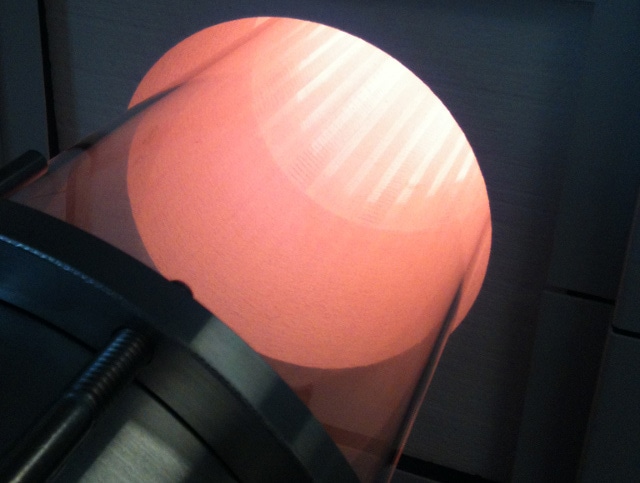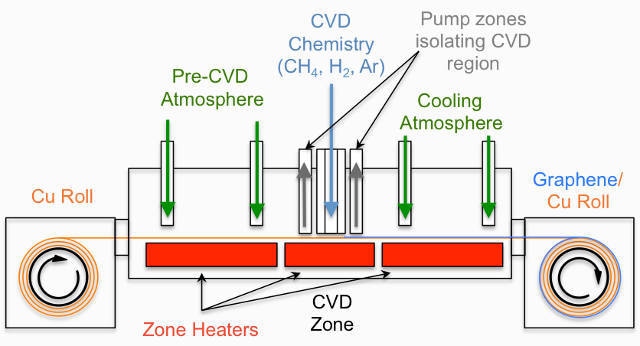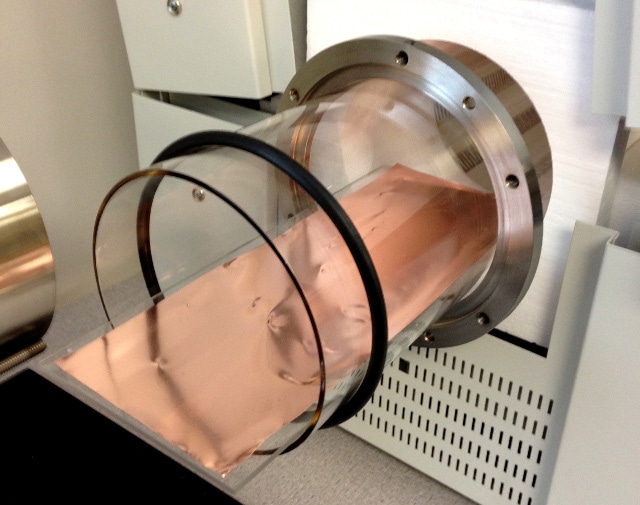A number of graphene manufacturing companies have appeared in the last few months - seeking to capitalize on the wave of investment and interest in the development of graphene-based products in a variety of industries. One of the most interesting companies to appear is Graphene Frontiers, a spin-out from the University of Pennsylvania.

A CVD furnace used to deposit a single layer of graphene on a substrate, such as copper. Image credit: Graphene Frontiers.
Graphene Frontiers is based on a novel technology developed at UPenn, which allows continous, roll-to-roll production of single-layer graphene at atmospheric pressure.
This is in contrast to conventional CVD graphene production, which requires high vacuum furnaces. Easing these extreme requirements should make the process much cheaper to operate.
The team behind Graphene Frontiers has received significant support from the National Science Foundation (NSF).
In 2011, after researchers Prof. Charlie Johnson and Dr Zhengtang Luo, and CEO Michael Patterson created their spin-out with the help of UPenn's UPstart program, the NSF awarded them one of their inaugural "Innovation Corps" prizes for entrepreneurship.

Schematic of the roll-to-roll graphene printing process being developed by Graphene Frontiers with the help of an NSF grant. Image credit: Graphene Frontiers.
In September 2013, Graphene Frontiers was awarded a $744,600 grant by the NSF. This grant will be used to further develop the company's roll-to-roll graphene printing process - increasing the capacity and tweaking the technology to make it ready for the demands of industrial-scale use.
Scaling up doesn't mean moving out though - Graphene Frontiers are happy to stay in Philadelphia where the company was born. CEO Michael Patterson told AZoNano:
"Graphene Frontiers will stay in Philadelphia to complete work on scaling up production. We believe that the unique combination of technology, tools, and talent available here makes Philadelphia the best place in the world to build an advanced materials and nanotechnology company."
Graphene's unique conductivity, strength, and transparency have led to a myriad of suggested applications in both industrial and commercial fields. Full realization of graphene's potential could well be disruptive to many of these fields, but current limitations in manufacturing volume, and in the quality of the product, limit the rate of adoption.
Companies like Graphene Frontiers are looking to overcome these limitations by developing viable industrial manufacturing processes for the "wonder-material". The team hope that, with the help of the NSF grant, their technology will allow graphene to significantly impact huge markets like electronics, sensors, and water desalination.
“Graphene will allow us to improve performance, lower cost and reduce the environmental impact of several billion-dollar industries.
We are proud to have support from the National Science Foundation, and together with industry partners, we expect to bring graphene films to market for use as filtration membranes in 2015 and as a key component in flexible electronics in 2016.”
Michael Patterson, CEO of Graphene Frontiers

A graphene film on a copper substrate as it exits the CVD furnace. Image credit: Graphene Frontiers
More Information